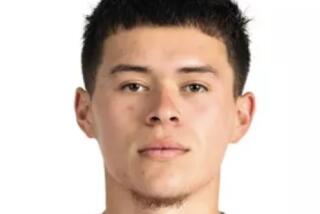The Keys to Lifting an Embargo : Pianist Gonzalo Rubalcaba’s move to the Dominican Republic has opened doors to the U.S., thanks to a ruling by the Treasury Department.
- Share via
Thoughtful, soft-spoken and articulate, Cuban pianist Gonzalo Rubalcaba smiles occasionally as he answers a reporter’s questions in a Century City hotel room.
Rubalcaba has reason to smile. He’s making his second appearance in the United States tonight, playing with his quartet at the Wadsworth Theater in Brentwood. And because of a new ruling by the U.S. government, these appearances are likely to become more frequent.
Just this week, the Treasury Department ruled that because Rubalcaba has established legal residence in the Dominican Republic, he no longer falls under the U.S. trade embargo with Cuba. This ruling has the effect of offering Rubalcaba, who still retains his Cuban citizenship, an open door to perform in the United States whenever he likes.
The United States has maintained an economic embargo with Cuba for 32 years, and has only rarely allowed visas for cultural exchanges. Rubalcaba’s first performance in this country--at New York’s Lincoln Center in May, 1993--and his two appearances this year (he’ll also play Saturday at the Aspen Jazz Festival) were examples of such visas.
The importance of the change in his status with the U.S. government isn’t lost on Rubalcaba.
“It’s very important for me to have the connection with the world of jazz, and with the musicians here in the States,” he says. “I need to be able to connect with those musicians, learn from them, and to present myself here.”
Not only will Rubalcaba be allowed to perform in the United States but under the ruling he can also be paid for his work. (The pianist donated his services for his New York debut, as well as for tonight’s concert, which is a benefit for the National Academy of Recording Arts and Sciences Foundation, a program that is dedicated to returning music education to our nation’s schools.)
Michael Krinsky, Rubalcaba’s attorney, says the shift in his client’s status was not the result of a major U.S. policy decision.
“When a Cuban national establishes residence in a third country, it’s standard Treasury Department procedure to license and unblock,” Krinsky said. After living in the Dominican Republic for more than a year, Rubalcaba was granted permanent legal residence there in March. The Treasury Department officially acknowledged that residence in its ruling this week.
Interestingly, Rubalcaba says he didn’t move to the Dominican Republic to gain easier access to the United States. “I made the first step toward a move there in 1989,” he says. “I was actually thinking about moving to Europe, because I was playing there so much, but when I established friendships and professional relationships in the Dominican Republic, I moved there with my family. Now I see there is a close relation between the styles of life of that country and Cuba.”
Still, he’s obviously pleased at his new status, and so is Krinsky. “The U.S. government could have continued to impose roadblocks if it had wanted to,” Krinsky said. “I think it is significant that this further action by the Treasury Department” has been granted to a musician who “has not broken his ties with Cuba, who goes there, performs there, is welcomed there as a major cultural figure.”
“Cuba is my home,” says Rubalcaba, 31, without hesitation.
However, the pianist does make it clear that he is first and foremost a musician. “I am an artist, linked to my traditions, my family, my country,” he says with some vehemence. “I am not a person who works for the government of Cuba.”
Rubalcaba will appear at Wadsworth with his Cuban quartet--Reynaldo Melian (trumpet), Felipe Cabrera (bass) and Julio Barreto (drums)--offering pieces from his four recordings, which were licensed to Blue Note by Somethin’Else Recordings of Japan. The pianist will also perform some duets with bassist Charlie Haden.
Haden first heard and played with Rubalcaba in Montreux, Switzerland, in the late 1980s and brought him to the attention of Blue Note president Bruce Lundvall, who arranged the pianist’s deal with Somethin’Else. Because of the U.S. trade embargo, Rubalcaba could not record directly for Blue Note. (A review of Rubalcaba’s newest recording, “Rhapsodia,” appears below.)
If Rubalcaba is quiet in conversation, he is the opposite in performance, unleashing torrents of notes that wash over the pulsating rhythms--from back-beats to surging Latin--that underpin his music.
Asked to describe his style, he says “it is everything from Afro-Cuban to all varieties of Latin to be-bop.”
Playing the piano gets Rubalcaba in touch with the deepest parts of himself, he says. “It is, to me, the most exquisite form of communication, that says we are alive. I can hear everything. What is far away, what is close, what is inside me, and what exists within the space that is occurring within the musical presentation.
“Rhythm is a basic element of our existence. It’s in everything that is alive.”
* Gonzalo Rubalcaba appears tonight at 8 at the Wadsworth Theater, VA Grounds, Brentwood. All seats: $26. Tickets: (310) 825-2101.
More to Read
Sign up for Essential California
The most important California stories and recommendations in your inbox every morning.
You may occasionally receive promotional content from the Los Angeles Times.













